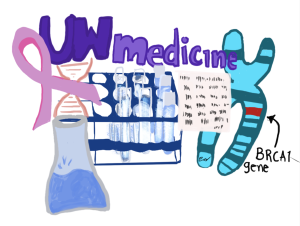1 Dr. Mary-Claire King (she/her)
By Muntaha Sohail (she/her)

In the Pacific Northwest, Dr. Mary-Claire King’s work serves as an important bridge between science and social justice. Dr. King grew up in Chicago and pursued a degree in mathematics at Carleton College before deciding to obtain her Ph.D. in genetics from the University of California, Berkeley. She then opted to continue her postdoctoral studies at the University of California, San Francisco. From 1976 until 1995, she was a professor at UC Berkeley. Since 1995, she has been a key figure at the University of Washington in Seattle, where she is the American Cancer Society Professor.
Her decision to pursue a career in cancer research was partially influenced by the loss of her childhood friend from cancer. Her work has been at the forefront of genetic discoveries ever since. Dr. King’s important discovery of the BRCA1 gene in 1990 transformed the medical world for breast cancer. This gene when mutated, can increase a woman’s risk of developing breast cancer from a mere 8% to 80% or more. This major discovery has revolutionized the development of genetic testing tools that can assist at-risk women in taking preventative measures, saving countless lives around the world.
In addition to her work on breast cancer, Dr. King has studied the genetics of schizophrenia, pediatric genetic illnesses, and the evolutionary relationships between humans and chimpanzees. Her research demonstrated that humans and chimpanzees share 99% of DNA sequences. Her work was not only fascinating, but it also added to the understanding of human biology and humans relationship with natural evolution.
Dr. King is also dedicated to human rights. She used her genetic expertise to reconnect families of the disappeared in Argentina. She worked with the Plaza de Mayo Grandmothers to create new DNA testing techniques in order to identify and return kidnapped children to their proper families, as well as having a role in the first case of wartime victim identification using DNA sequencing. Her work has highlighted the importance of science in promoting justice and healing communities ripped apart by political violence.
Her time in Seattle has been distinguished not only by significant scientific achievements, but also by her unwavering support of using science as a tool for the common good. Her work has had a considerable impact on health policies and practices, both locally and globally, impacting how genetic research is carried out and utilized in real-world situations around the world. She has also won countless awards throughout her career.
Dr. King’s journey from a mathematics enthusiast in Chicago, to a renowned geneticist and human rights campaigner in Seattle, shows a life dedicated to uncovering genetic secrets and fighting for justice. Her story is about more than simply scientific achievements, it also exhibits the immense impact that one person has on society by combining scientific research with compassion for humanity.

